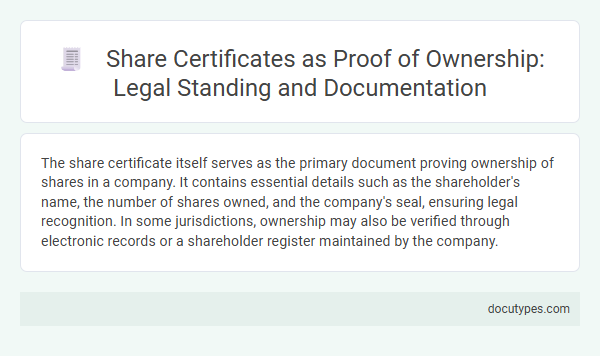The share certificate itself serves as the primary document proving ownership of shares in a company. It contains essential details such as the shareholder's name, the number of shares owned, and the company's seal, ensuring legal recognition. In some jurisdictions, ownership may also be verified through electronic records or a shareholder register maintained by the company.
Introduction to Share Certificates
Share certificates serve as official documents that prove ownership of shares in a corporation. Understanding the role of these certificates is essential for managing your investment rights effectively.
- Definition of Share Certificate - A share certificate is a physical or electronic document issued by a company confirming the holder's ownership of a specific number of shares.
- Proof of Ownership - This certificate legally establishes your ownership in the company and your entitlement to dividends and voting rights.
- Use in Transactions - Share certificates are required to transfer ownership or settle disputes regarding share ownership.
Defining Share Certificates: Key Elements
A share certificate is an official document that certifies ownership of shares in a corporation. It serves as legal proof that the holder owns a specified number of shares in the company.
Key elements of a share certificate include the shareholder's name, the number of shares owned, and the company's name. The certificate also features unique identification numbers and authorized signatures to validate its authenticity.
Legal Status of Share Certificates
| Topic | Details |
|---|---|
| Document Proving Ownership | Share certificates serve as the primary legal evidence of ownership in a company's shares. These certificates contain essential details such as the shareholder's name, number of shares held, and the date of issuance. |
| Legal Status of Share Certificates | Share certificates act as tangible proof of ownership rights recognized by corporate law and regulatory authorities. They establish the shareholder's legal claim to dividends, voting rights, and capital. |
| Implications for Shareholders | Your possession of a valid share certificate confirms your authorized ownership and entitlement under company statutes. Losing the certificate may require formal procedures to issue replacements due to its legal importance. |
Share Certificates as Proof of Ownership
A share certificate is a legal document that serves as proof of ownership in a corporation. It specifies the shareholder's name, the number of shares owned, and the company's details.
The share certificate acts as tangible evidence of the shareholder's rights in the company, including voting privileges and dividend entitlements. It is issued by the company's registrar or secretary and is often required to transfer shares or assert ownership. This document plays a crucial role in verifying and protecting shareholder interests in both private and public companies.
Mandatory Information on Share Certificates
Share certificates serve as legal proof of ownership in a company, documenting the shareholder's stake. They must contain specific mandatory information to validate the ownership claim.
Essential details on share certificates include the shareholder's name, certificate number, and the number of shares owned. The certificate must also specify the company's name, registration number, and the date of issue.
Role in Shareholder Rights and Entitlements
A share certificate serves as the primary document proving ownership of shares in a corporation. It plays a crucial role in establishing shareholder rights and entitlements.
- Proof of Ownership - The share certificate legally confirms the holder's ownership of a specified number of shares in the company.
- Dividends Entitlement - Shareholders with certificates are entitled to receive dividends declared by the company proportional to their shareholding.
- Voting Rights - Ownership evidenced by the share certificate grants the shareholder the right to vote at company meetings and influence corporate decisions.
This document is essential for asserting and exercising all shareholder privileges within a corporation.
Share Certificate Issuance and Transfer Procedures
Ownership in the case of share certificates is proven by the physical share certificate issued by the company, which contains details such as the shareholder's name, number of shares, and certificate number. The issuance procedure involves recording your name in the company's shareholder register and providing the certificate as evidence of your shareholding. Transfer procedures require endorsing the share certificate and updating the shareholder register to reflect the new owner's details, ensuring legal recognition of the transfer.
Electronic Share Certificates and Dematerialization
Electronic share certificates serve as proof of ownership in the modern digital securities market. Dematerialization replaces physical share certificates with electronic records, simplifying ownership verification and transfer processes.
- Electronic Share Certificate - A digital record maintained by authorized depositories confirming shareholder ownership.
- Dematerialization - The process of converting physical share certificates into electronic form to enhance security and accessibility.
- Ownership Verification - Electronic records provide accurate, easily accessible proof of ownership without the risks of physical loss or damage.
Risks and Legal Challenges with Share Certificates
Share certificates serve as physical proof of ownership in a company's shares, but they carry significant risks such as loss, theft, or forgery. Legal challenges arise when certificates are misplaced or disputed, complicating the transfer and verification of ownership rights. Courts often require extensive documentation and validation, making electronic records a safer alternative for proving share ownership.
What Document Proves Ownership in the Case of Share Certificates? Infographic

